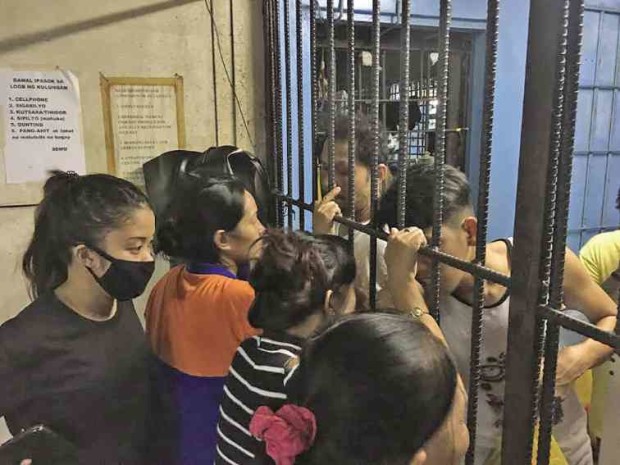
Visiting time is a little tricky at a Pasay police jail with inmates and visitors alike waiting for their turn to stand right next to the steel bars for a chance to see and talk to their loved ones. —Dexter Cabalza
Right after the discovery of a secret jail at a police station in Manila drew a lot of flak, the Pasay police is doing its best to assure officials that it is observing the rights of its detainees.
In an inspection conducted earlier this month of detention facilities under the Pasay police, Chief Insp. Rolando Baula, the city’s assistant police chief for operations, said that no secret jails were found.
“No secret detention or any similar forms of detention was found as it (police) strictly observed nonestablishment of [these] under Republic Act No. 9745, or the Anti-Torture Act of 2009,” he reported.
The Philippine National Police, the Manila Police District in particular, came under fire when the Commission on Human Rights (CHR), acting on a tip, found a secret jail hidden behind a bookshelf at the Raxabago, Tondo police station on April 27.
A dozen men and women were locked up in the cell which did not have electricity or running water. The detainees claimed that they were arrested on drug charges, some of them alleging that they had been held there for about a week. Most said that they were being asked to produce money in exchange for being released.
For his part, Senior Supt. Robert Domingo, the station commander, denied that the cell was deliberately being hidden from the public. He also stressed that the detainees had just been arrested the day before and the charges against them were still being prepared.
Following the incident, National Capital Region Police Office chief, Director Oscar Albayalde, relieved Domingo and 13 members of the station’s Drug Enforcement Unit pending an investigation.
PNP chief, Director General Ronald dela Rosa, however, defended his men, saying the use of the hidden cell was meant to prevent overcrowding because the regular cell was already full.
Asked if it would be self-serving for the Pasay police to inspect its own facilities, Baula replied: “We are not hiding anything here.”
Baula also noted that their facilities were overcrowded and the majority of prisoners were already complaining of skin problems and hypertension.
In an interview with the Inquirer, Baula said they asked the city health office to conduct medical checkups of the detainees and distribute ointments, antibiotics and supplements.
The 30-square-meter detention cell of the Pasay police investigation unit, for example, was ideal for only 50 inmates, Baula said. But during a recent visit, the Inquirer noted that it was holding 66 persons: 57 men and nine women, mostly theft and robbery suspects.
Baula said he had already transferred 12 of the original 78 inmates, who committed petty crimes such as violation of city ordinances, to the nearby Libertad and Arnaiz police community precincts.
“We have a limited area for them but we make sure that their rights are observed,” Baula added. “They are jailed but they have family members waiting for them to be free.”
An inmate said their detention cell was better compared to others as it was equipped with four stand fans and a ceiling fan. There were seven exhaust fans but at that time, only four were working.
SPO1 Jonathan dela Torre, administrative officer of the investigation unit, said they had asked city hall to expand the jail by 15 square meters to improve ventilation.
He added that they had also asked concessionaires to serve hot chocolate or coffee for the inmates at P5 each. “We treat our inmates special here. I don’t think the CHR can say something bad about that,” he said.